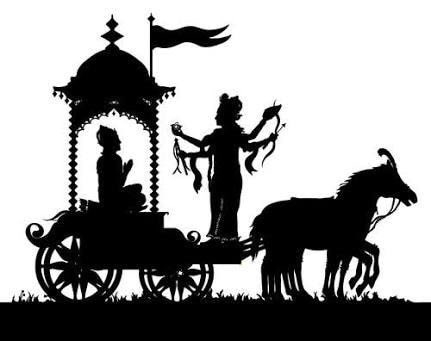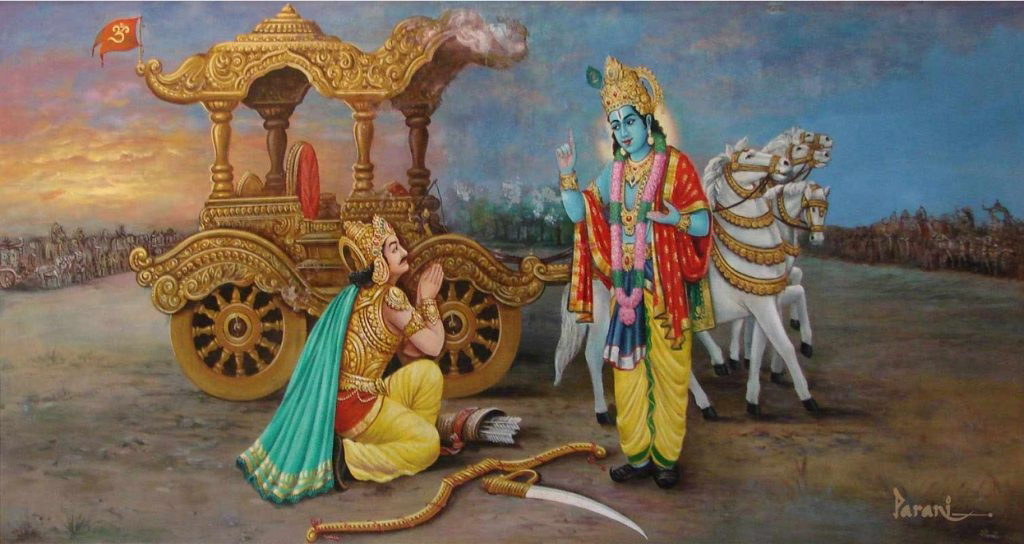The Bhagavad Gita | Chapter 13 : The Field and Its Knower |
Summary
Krishna explains the distinction between the body as the "field" and the Self as the "knower of the field." Krishna reports that he is "the Knower of the field / in every body": he is the ultimate "Self" present in all beings. On the most basic level, Krishna is the Self/knower in every field/body. He describes the elements that make up the "field" and the attributes of a "knower." The "object of knowledge" is the supreme reality and essence of all things. A truly wise person demonstrates "persistence in knowing the Self / and awareness of the goal of knowing." Krishna refers to this as authentic knowledge. He tells Arjuna that a devotee who understands these concepts and their relation to one another "is ready for [God's] state of being."
According to Krishna, nature causes activity, such as heat or cold, in the body. The Self is what generates responses to bodily activity, such as pain and pleasure. Both are manifestations of God and are "without beginning." Whether positive and loving, passionate and active, or dull and negative, a person's natural disposition interacts with nature. Nature creates the activity in the body that makes up existence and all its chaos. Still, the Self is separate from the experience of nature and the body with their related positive and negative reactions and feelings. Understanding this separation will help free a person from the cycle of rebirth. Krishna wants Arjuna to understand that the Self is part of God, even though while embodied it experiences the impact of both nature and the body. A wise person knows that the Self is ultimately separate from nature and the body. Realizing this separation will bring the devotee serenity because the Self will stop being affected by the temperament of one's nature.
Analysis
Continuing his discourse on the nature of existence and transcendence, Krishna outlines three elements of existence. These are the field, the Knower, and the object of knowledge. The field describes nature, or the physical world, which includes the body and the entire perceivable world. When Krishna outlines the field, he mentions the 5 elements and the 10 senses. The five elements include the standard four of earth, air, fire, and water, and the fifth of ether, or space. The 10 senses that the text mentions can be divided into two parts: sensory and motor. The sensory faculties include sight, hearing, smell, taste, and touch. The motor faculties and related uses include the hands for grasping, voice for speaking, legs for walking, genitals for procreating, and anus for eliminating. Humans experience nature, or the physical world, through these faculties.
The Knower in Krishna's explanation is the Self. Because the Self and God are ultimately one, the Knower is both the Self and God. The Self and God are the same and reside "outside yet within all beings ... / subtle beyond comprehension." The Knower "is seated in the hearts of all beings." In other words, a devotee has a body to experience nature, but the Self is not the physical body. The Self and God, or presence, is always within each being whether clearly perceived or not. By detaching from the body and developing awareness of this presence of Self and God, one moves closer to Krishna.
Krishna speaks frequently of "knowing" and "knowledge." The type of knowing he describes is different from the way the term is usually used in English. The verb to know in English expresses knowing or familiarity with a fact or an individual. However, in the context of yoga and Krishna's teachings, the word has a deeper significance. It can be thought of as more like the terms to get and to understand, as in "to get a joke." When someone goes from the state of not getting a joke to the state of getting that joke, an internal change occurs. In the same way, a person might understand and know the basic principles of what Krishna is teaching. Until the person moves into a state of truly getting those concepts, they have not achieved liberation from the cycle of suffering or rebirth.
Application in human affairs
In the realm of human affairs, the teachings from Chapter 13 of the Bhagavad Gita can be applied to foster a deeper understanding of oneself and the world. Just as Krishna emphasizes the distinction between the "field" (physical body and external world) and the "knower of the field" (the Self), individuals can reflect on their own experiences.
1. Self-awareness and Authentic Knowledge:
Cultivating self-awareness is crucial in navigating the complexities of life. Understanding oneself beyond the physical body—recognizing the deeper essence within—is a step toward authentic knowledge. In practical terms, this involves introspection, mindfulness, and a persistent effort to know one's true nature.
2. Nature and Responses to Life:
Recognizing that nature (including the body and external circumstances) influences our experiences, reactions, and emotions is vital. In human affairs, this understanding can lead to greater empathy and compassion, as individuals grasp that everyone is subject to the interplay of nature. It encourages a thoughtful response to challenges and a compassionate approach to others.
3. Freedom from the Cycle of Rebirth:
While the concept of rebirth may be metaphorical in human affairs, the idea of breaking free from repetitive patterns and cycles holds significance. Applying the teachings involves consciously detaching from the transient aspects of life, finding inner serenity, and not allowing external circumstances to dictate one's inner state.
4. Unity and Connection:
The Gita emphasizes the unity of the Self with the divine. In human interactions, recognizing this shared essence can foster a sense of interconnectedness and unity. It encourages individuals to look beyond superficial differences, promoting harmony, tolerance, and understanding in diverse communities.
5. Transformation through Knowledge:
In human affairs, the pursuit of knowledge is not just about acquiring information but undergoing transformative experiences. The application lies in actively seeking wisdom, questioning assumptions, and evolving personally and collectively. True knowledge, as described by Krishna, leads to a profound shift in perspective.
6. Mind-Body Distinction:
Understanding the separation of the Self from the body encourages a healthier relationship with the physical self. It implies taking care of the body while not solely identifying with its transient nature. This perspective can influence lifestyle choices, promoting holistic well-being.
In essence, the application of the Bhagavad Gita's teachings in human affairs involves integrating spiritual principles into daily life. It calls for a balanced approach that embraces self-awareness, compassion, and the pursuit of authentic knowledge, contributing to personal growth and a harmonious society.
कृष्णम् वन्दे जगद्गुरुम्🙏



Comments
Post a Comment